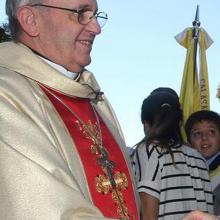Buenos Aires
The fact that none of the five are Italian, and none hold Vatican positions, underscores Francis' conviction that the Church is a global institution that should become increasingly less Italian-centric.
These new cardinals include prelates from 11 dioceses and six countries that have never before had a cardinal, and from places far outside the traditional European orbit of ecclesiastical influence: Albania, for example, plus the Central African Republic, Lesotho, Mauritius, Bangladesh, Malaysia, and Papua New Guinea.
But the real surprise in these picks, as in past appointments, is that they came as a complete surprise to many of the new cardinals themselves, and to the pope’s closest collaborators.
Pope Francis will be accompanied on his first visit to the Middle East by Argentine Rabbi Abraham Skorka and Muslim leader Omar Abboud — two friends from Buenos Aires.
“This dimension of interreligious dialogue has great significance,” the Vatican’s official spokesman, the Rev. Federico Lombardi, told the media.
Jews worldwide welcomed newly elected Pope Francis as a friend on Wednesday, and pointed in particular to his sympathetic and strong reaction to the 1994 bombing of a Jewish center in his native Argentina — the deadliest bombing in the country’s history.
As Cardinal Jorge Mario Bergoglio, the archbishop of Buenos Aires, Francis “has had a warm relationship with the Jewish community of Argentina, and enjoyed close friendships with many prominent rabbis,” said Rabbi David Rosen, international director of interreligious affairs at the American Jewish Committee. “As far as I have heard and read in the few minutes since he was elected pope, he has shown deep signs of respect and friendship towards the Jews,” said Riccardo Di Segni, the chief rabbi of Rome. “It’s a good starting point.”
Francis. Pope Francis. This could be good news for the Catholic Church, for the whole church, and for the world. Let’s hope and pray so.
Jorge Bergoglio, the Argentinian cardinal from Buenos Aires, will be the first pope from Latin America and the first outside of Europe in a millennium. That’s good news from the start. And the world is now learning about the 76-year-old new pontiff whose election caused the white smoke to rise in the night skies of Rome to the cheers of tens of thousands of people in St. Peter’s Square. A Jesuit scholar, he seems to be a humble man who lives simply, choosing to live in a small apartment instead of the archbishop’s palace, and travel on buses and trams instead of in the church limousine.
Will simplicity and social justice become the witness of the Roman Catholic Church around the world — and will it emanate from the first pope from the Global South, which is clearly the growing future of the church? What good news that would be.
Argentinian Cardinal Jorge Mario Bergoglio was elected as Pope Francis I on Wednesday, after only two days of voting in the conclave tasked with choosing a successor to Pope Benedict XVI.
According to anonymous reports of the 2005 conclave, he was the leading contender against then-Cardinal Joseph Ratzinger, who became Benedict XVI. Bergoglio, 76, has served as the archbishop of Buenos Aires since 1998 and was made a cardinal in 2001. He is the first Latin American and the first Jesuit to rise to the papacy.
In his first address to the huge crowd that had gathered in St Peter’s Square, Francis asked for the prayers of “all men and women of good will” to help him lead the Catholic Church.





